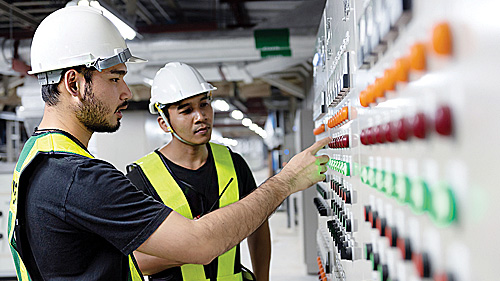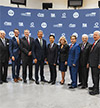Workforce Development Programs Are in Overdrive
Job losses resulting from the pandemic have made upskilling of workers for the post-COVID economy even more critical, and government and private organizations are stepping up.
Workforce Q4 2021

The COVID-19 pandemic has hurt every business sector and driven many employees to retire or quit. This is especially hard on the manufacturing industry, where an enormous skills gap already exists. To create the most competitive labor pool, workforce development departments have brought technology to the forefront, especially for recruitment, training, and “upskilling” to different positions, or even entry into completely different industries. Some workforce development programs like Georgia Quick Start, LED FastStart, and AIDT have been around for years. But state workforce development departments — as well as private organizations — across the nation are now being even more creative and proactive in advancing the skills of workers to help them build rewarding careers in these challenging times.
Rapid Response Teams
In light of the economic losses caused by the pandemic, Alabama’s Rapid Response Team moves quickly to assist companies and employees that have been negatively impacted by staff reductions or reduced operations. Team members visit with upper management and employees on-site to provide advice on unemployment compensation, pension benefits, health insurance, and other job-seeking concerns, including training and upskilling to new positions.
New Hampshire’s NH Works is a similar program that delivers early intervention re-employment services as quickly as possible, at no cost to the businesses or employees who are suffering from layoffs and/or closings. The rapid-response team helps individuals design a plan for re-employment, including coursework and upskilling, and advises them on state and federal programs that can assist them during their transition.
Digital technologies and connectivity have become essential tools for supporting and retraining displaced workers, as well as recruiting them. Customized Talent Pipelines
Launched in 2014, the U.S. Chamber of Commerce Foundation’s Talent Pipeline Management (TPM) program is active in 37 states. TPM helps companies build scalable, sustainable pipelines of skilled workers for their industries and collaborate with their educational/training partners on developing curriculum. “The TPM approach builds external pipelines — adequately preparing talent that has yet to walk through the door—as well as long-term strategies for backfilling, upskilling, career pathway development, and succession planning,” states the U.S. Chamber of Commerce.
Businesses collaborate to manage these talent “supply chains” by projecting employment needs using real-time data and developing focused training solutions. In Kentucky, for example, “We continue to adjust to new information derived through TPM data and we have found ways to adapt our collaborative work to statewide initiatives,” says LaKisha Miller, TPM director for the state of Kentucky.
Expanding Educational Infrastructure
States are building more training assets and infrastructure to meet the challenges of the pandemic-reduced workforce and the growing skills gap. In Arizona, local and industry partners collaborated to launch Drive48, a 13,000-square-foot workforce training facility located at Central Arizona College. The Drive48 facility houses multiple assembly robots used for training technicians in programming, maintenance, problem solving, troubleshooting, safety, general system requirements, and more for the region’s booming automotive and advanced manufacturing industries.
In Missouri, Ozarks Technical Community College is building a $40 million center for advanced manufacturing in Springfield, which will feature educational and training opportunities in robotics, fabrication, mechatronics, automation, and drafting and design.
And LED FastStart in Louisiana has committed $1.2 million to build a 50,000-square-foot digital library at Grambling State University and strengthen local partnerships with leading advanced technology companies in the region.
Private-Sector Training and Development
Up to 4.9 million low-wage U.S. workers may need to transition into higher-wage roles and develop new skills to remain employed in the digital economy, according to McKinsey. Thus, in early 2020, Coursera launched its Workforce Recovery Initiative to help governments respond to the unemployment crisis caused by the pandemic. To date, this program has supported displaced workers in more than 25 states by providing free access to thousands of online courses for skills training.
In Tennessee, for example, through the Tennessee Department of Labor and Workforce Development (TDLWD)-Coursera partnership, thousands of Tennesseans have skilled up and returned to work. “Our work with the state of Tennessee has already helped thousands of hard-working citizens prepare for high-demand local jobs, including roles in IT support and contact tracing,” says Jeff Maggioncalda, Coursera CEO.
Merit, which provides digital credential issuing, verification, and reporting for government agencies, launched its WorkNow program to assist states with their efforts to get millions of unemployed people back to work. By digitally tracking workers’ skills and credentials, workforce development leaders can be more effective in directing training resources toward programs and employee groups that will gain the most economic benefit.
In a public-private development initiative, Back to Work Rhode Island has partnered with Google Cloud to create an online career platform that provides laid-off workers with the tools for finding jobs and being matched with meaningful career opportunities through a virtual career center. “Our collaboration with Google Cloud has married accessible technology with government innovation to train and connect workers with the resources they need to access in-demand jobs,” says Sarah Blusiewicz, assistant director of workforce development for Rhode Island’s Department of Labor and Training.
Upskilling Tools and Technologies
Reskilling, upskilling, and increased training will play an important part in the nation’s economic recovery. Business models have been severely disrupted, and employers are now forced to pivot and reallocate their workers into unfamiliar roles. Digital technologies and connectivity have become essential tools for supporting and retraining displaced workers, as well as recruiting them.
In Wisconsin, the Workforce Solutions Initiative includes the launch of a virtual career center and a mobile career lab, which delivers workforce-related services throughout the state.
Virginia’s Talent Accelerator Program provides technology-based training and recruitment solutions that are fully customized to a company’s unique operations, including simulations, broadcast-quality videos, illustrated work instructions, instructor-led classroom sessions, animations, and e-learning modules.
JumpStartAL, a private-public partnership in Alabama, uses virtual reality (VR) training solutions from job simulator TRANSFRVR to provide new education and training programs that are accessed remotely. “The initiative will highlight career paths needed for Alabama to meet its goal to increase its workforce by 500,000 highly skilled workers by 2025,” according to state sources.
Moving Forward with WIN
To mitigate the dire impacts from COVID-19, the National Governors Association (NGA), with founding sponsorship from the Cognization Foundation, launched the Workforce Innovation Network (WIN) to help states recover from the pandemic.
The National Governors Association (NGA), with founding sponsorship from the Cognization Foundation, launched the Workforce Innovation Network (WIN) to help states recover from the pandemic in January 2021. Launched in January 2021, the objective of WIN is to secure assistance for displaced workers and affected businesses, while building new frameworks and interventions to support a more equitable economic recovery. “As governors lead efforts to promote equitable and forward-looking economic recovery in their states and territories, the Workforce Innovation Network helps facilitate innovative state-level policy solutions that improve employment and workforce outcomes,” says the NGA.
WIN provides funding to help states build capacity for near-term innovation and longer-term strategies to prepare their workforces for a post-COVID-19 economy. WIN plans to focus on four areas: expanding access to essential support services, rapidly connecting job-seekers to work, advancing digital access and skill development, and enhancing job quality for all workers.
To join WIN and receive grants to undertake this work, states must submit detailed proposals about how they will create new virtual service delivery platforms, digital inclusion and skill development strategies, and equitable access to high-quality work opportunities via the adoption of new state job quality and self-sufficiency standards. States that have joined WIN so far include Alabama, Arizona, Colorado, Hawaii, Illinois, Maine, Missouri, New Mexico, Nevada, and Washington.
As transformation accelerates, partnerships will become more critical, says Kevin Mills, head of Government Partnerships at Coursera. Workforce agencies and employers need to work closely to anchor training initiatives to high-demand skills, as well as provide direct pathways to job placement. Aggregating and using real-time progression and outcomes data will help workforce development agencies personalize career exploration, reskilling, and job placement for unemployed workers.
“Workforce development programs will be key to increasing equitable participation in the digital economy,” Mills says. “Collaboration among workforce development agencies, educators, and employers will be critical to level the playing field for workers and unlock economic opportunity for communities across the country.”
Project Announcements
Teradyne Plans Wixom, Michigan, Robotics Operations
12/11/2025
Robinson Plans Altoona, Iowa, Manufacturing Operations
12/11/2025
BioTouch Expands Columbus, Georgia, Operations
12/11/2025
Natrion Plans Erie County, New York, Battery Components Operations
12/11/2025
Czech-Based GZ PrintPak Expands Mount Pleasant, Wisconsin, Manufacturing Operations
12/11/2025
Dubai-Based Asis Boats USA Plans Conway, South Carolina, Operations
12/10/2025
Most Read
-
The Workforce Bottleneck in America’s Manufacturing Revival
Q4 2025
-
Rethinking Local Governments Through Consolidation and Choice
Q3 2025
-
First Person: Filter King’s Expansion Playbook
Q3 2025
-
Lead with Facts, Land the Deal
Q3 2025
-
How Canada Stays Competitive
Q3 2025
-
America’s Aerospace Reboot
Q3 2025
-
Investors Seek Shelter in Food-Focused Real Estate
Q3 2025



